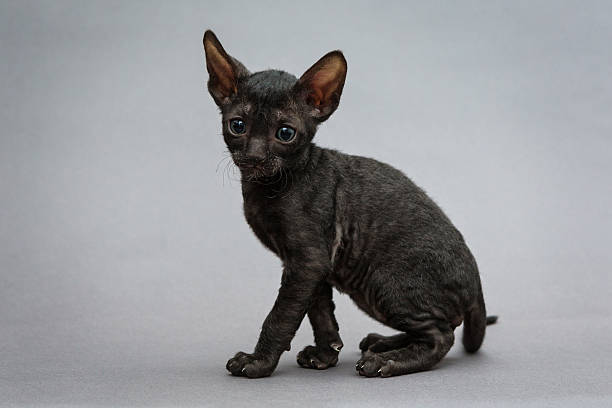Cornish Rex

History:
In 1950, in Cornwall, England, the Cornish Rex cat with soft, curly fur was found in a litter. This cat was given to breeder Nina Ennismore. The breeder raised the kitten and shared it with other breeders. Eventually, the Cornish Rex gained popularity across Europe and America. Unlike most cats, it lacks guard hairs; its coat is made only of soft, wavy down. In 1964, the CFA recognised it, and in 1979, accepted it for the championship competition.
Size: Medium to large-sized cat
Height: 23-30 cm
Weight: 3-6 kg
Life Expectancy: 12 to 16 years

Breed Appearance:
The Cornish Rex is a medium to large-sized cat with a slim, muscular body. They are known for their unique, soft, wavy coat that feels almost like velvet. The cats have a graceful appearance and weigh between 6 and 10 pounds. Their coat is fine, short, and curly, and they come in a wide range of colours, including black, white, cream, and tabby patterns.
Cornish Rex cats have large, almond-shaped eyes that are set at an angle, and their eye colour can be green, gold, or blue. Their coat is quite smooth and tightly curled, giving them a distinctive, elegant look. The breed's overall appearance is similar to that of the Devon Rex.
Health & Care:
Cornish Rex cats can also be prone to certain genetic health issues, similar to other breeds. When purchasing a Cornish Rex, it's essential to ensure the breeder provides information about the cat's health history. Common health issues in the breed include hypertrophic cardiomyopathy (HCM), a heart condition, and spinal deformities such as lordosis or scoliosis. Be cautious of breeders who claim to have HCM-free cats without providing proof of testing.
Additionally, Cornish Rex cats are prone to skin problems due to their unique coat, and they may develop allergies. Vaccinations, including those for panleukopenia, feline herpesvirus, calicivirus, rabies, and Felv, are also essential for maintaining their health.

Living Conditions:
The Cornish Rex cat is also a friendly and affectionate companion, forming strong bonds with both humans and other pets. Due to their social nature, they do not like being left alone for long periods and thrive in households with ample interaction. While they are highly energetic and playful, it’s essential to engage them in activities to keep them mentally and physically stimulated.
Regular playtime helps burn off their energy. Cornish Rex cats enjoy cuddling, especially with children, as long as the kids treat them gently and respect their boundaries.
Grooming:
The Cornish Rex requires regular grooming to maintain their unique coat. Bathing is essential to keep their curly fur clean, as it can become greasy due to the natural oils produced by their skin. Bathing can also be a pleasant experience for a kitten if introduced early. Besides regular baths, grooming includes weekly nail trimming, brushing their teeth with pet toothpaste, and occasional ear cleaning with cotton balls or tools recommended by a vet.
Due to their minimal shedding, Cornish Rex cats do not require frequent brushing for shedding, as excessive grooming can damage their delicate coat.

Advantages:
-
Cornish Rex cats are friendly and social, quickly forming bonds with humans and other pets.
-
They have a low-shedding, unique curly coat that requires minimal brushing.
-
Their playful and energetic nature makes them entertaining companions.
-
Cornish Rex cats are known for their affectionate and cuddly temperament.
Disadvantages:
-
Due to their thin coat, Cornish Rex cats are sensitive to cold and may need extra warmth.
-
They require regular bathing to maintain their coat and prevent oils from building up.
-
They may develop skin allergies or other health issues if not properly cared for.
-
Cornish Rex cats are highly active and require regular playtime and mental stimulation to stay happy.

